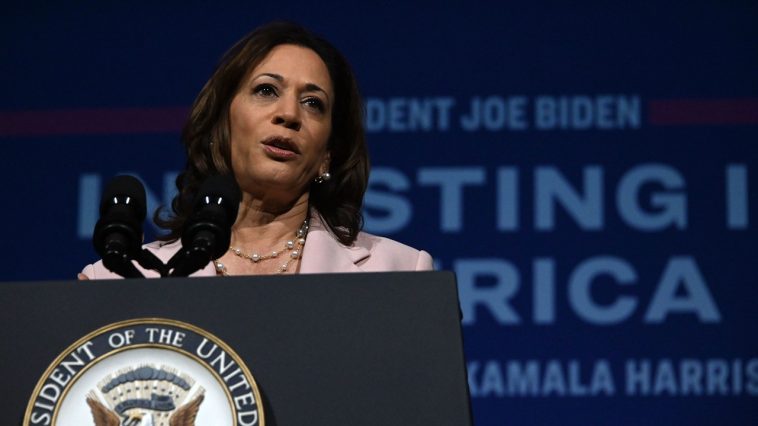LISTEN HERE:
The week of Vice President Kamala Harris found an additional hiccup as on Friday she seemed to mistakenly argue for a reduction in population as a means to achieve cleaner air and drinking water.
Caught in a possible slip of the tongue, the Vice President’s remarks would strike some as unusual, given they were delivered at a gathering at Coppin State University in Baltimore, Maryland.
Her talk was predominantly focusing on the issue of the Inflation Reduction Act. It was during this pivotal speech that Harris may have intended to say ‘pollution’ rather than ‘population.’ A minor gaffe perhaps, but not an insignificant one in high-stakes politics.
This small error comes only a few days after Harris tried to shed light on the topic of artificial intelligence. It occurred during an extensive discussion with labor and civil rights leaders. It has been a week with more than one mishap for the Vice President indeed.
While these missteps may mean little individually, they have the potential of creating an overall perception. And in the fiercely competitive world of politics, every word counts.
Far from suggesting any drastic measures to curb population growth, the Vice President was supposed to express her endorsement of measures intended to control pollution.
This comes from a simple linguistic mix-up, albeit one with significant implications, given the context.
A cleaner environment, safe drinking water, and air are universal goals shared across all political and social spectrums.
However, the method of achieving such an ideal is contentious, often becoming a battleground for differing political ideologies.
These unfortunate incidents could pose as an essential lesson on the necessary precision demanded in the political world.
Every word uttered in this sphere can heavily impact public perception and could steer away from the intended message.
Conservatives could see it as a prime example of the challenges that sometimes arise in this administration, shedding light on a larger conversation around clarity and articulation of ideas.
It was indeed an interesting spectacle at the roundtable discussion when the Vice President endeavored to explain the complex subject of artificial intelligence.
Not every attempt at communication, however, translates perfectly, especially when delving into topics of high complexity such as AI.
AI remains a highly technical and challenging terrain, and it’s possibly one of the last subjects people anticipate finding in a political conversation.
As such, missteps in discussions about such an intricate topic are, in many cases, understandable.
In most cases, the key aim in discussing artificial intelligence is to emphasize the potential interdisciplinary value it possesses.
But it becomes crucial that the conveyed message aligns with this framework and is not lost in translation.
Even as a minor slip in conversation, the Vice President’s week in public view focused more on these small missteps. Whether they carry significant weight or are blown out of proportion, the verdict is subject to personal interpretation.
Neither gaffes pull away from the substance and determination that the Vice President brings to her role.
These instances highlight the complexities involved in public speaking, and that one’s words can often be placed under a microscope, particularly when politics are involved.
The conservative viewpoint might use these instances as an opportunity to evaluate the clarity in communication and the level of detail involved when dealing with such critical matters.
It could signify the possible areas where the administration could consider lending more attention.
Last but not the least, the incidents over the past week are an affirmation of the high-demand nature of politics and the necessity for clear and precise communication.
After all, in a high-stakes environment like politics, even seemingly small details can have dramatic implications.


